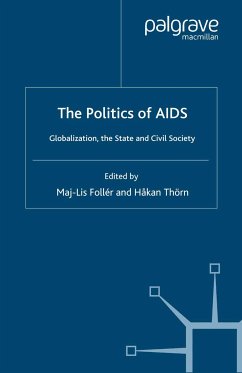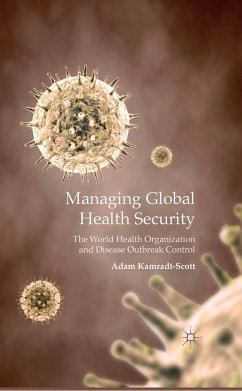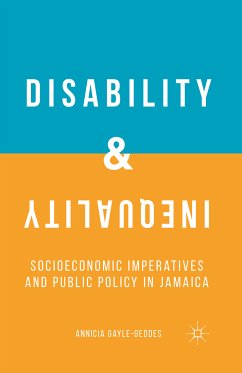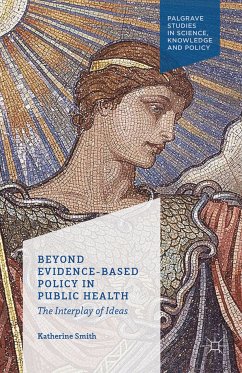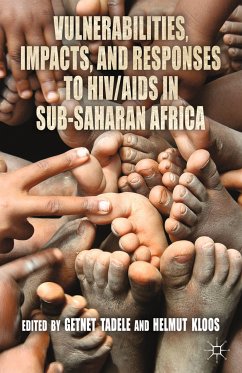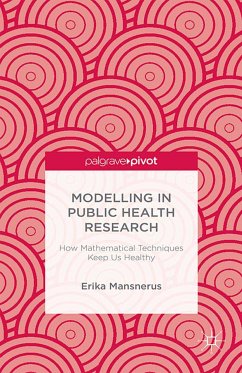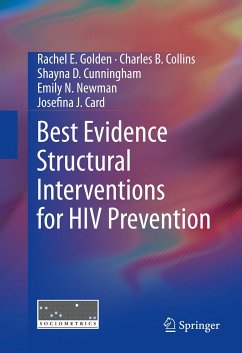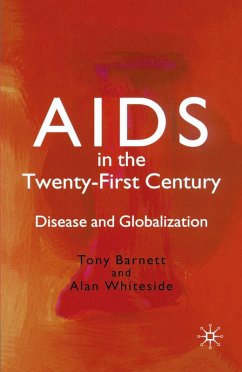
AIDS in the Twenty-First Century (eBook, PDF)
Disease and Globalization

PAYBACK Punkte
40 °P sammeln!






Essential reading for social and medical scientists and all those interested in infectious diseases and public health, AIDS and the Twenty-First Century examines the social and economic origins and impacts of the HIV/AIDS epidemic. HIV/AIDS is not only a medical problem. It is an indication of the scale of the global crisis in public health. Accessibly written, this book is necessary reading for policymakers, students and all those who are concerned about the relationship between poverty, inequality and infectious diseases.
Dieser Download kann aus rechtlichen Gründen nur mit Rechnungsadresse in A, B, BG, CY, CZ, D, DK, EW, E, FIN, F, GR, HR, H, IRL, I, LT, L, LR, M, NL, PL, P, R, S, SLO, SK ausgeliefert werden.
TONY BARNETT was Professor of Development Studies at the School of Development Studies, UEA, Norwich. He is now ESRC Professorial Research Fellow at the Development Studies Institute of the London School of Economics. He has been Overseas Visiting Professor at the Institute of Developing Economies in Tokyo. The Royal Anthropological Institute recently awarded him the Lucy Mair Medal for Applied Anthropology to honour excellence in the application of anthropology to the relief of poverty and distress, and to the active recognition of human dignity. ALAN WHITESIDE is Director of the Health Economics and HIV/AIDS Research Division at the University of Natal, South Africa. He is editor of AIDS Analysis Africa. He has undertaken a wide range of consultancy projects and published numerous papers on HIV/AIDS. His most recent book (with Clem Sunter) is AIDS: The Challenge for South Africa.
Produktdetails
- Verlag: Palgrave Macmillan UK
- Seitenzahl: 416
- Erscheinungstermin: 6. Juni 2002
- Englisch
- ISBN-13: 9780230599208
- Artikelnr.: 54116516
'The text is well-written, exceptionally informative, impressively clear even on complex scientific issues, and balanced in its judgements. It is written by two acknowledged experts in the field. The book is timely and important and should be published. I cannot think of two authors more suited to undertake such an ambitious and wide-ranging piece of work.' - Professor Shula Marks, School of Oriental and African Studies, University of London
'Overall, it is an impressive book, worthy of publishing. I certainly do not know of any other book that provides such a broad picture of causes and consequences. The sociology in the book on susceptibility and its causes and effects is, perhaps, the most unique aspect. It raises lots of
'Overall, it is an impressive book, worthy of publishing. I certainly do not know of any other book that provides such a broad picture of causes and consequences. The sociology in the book on susceptibility and its causes and effects is, perhaps, the most unique aspect. It raises lots of
Mehr anzeigen
interesting issues and provides a useful depth of information. The section on economic impacts is first rate and includes a wealth of examples that should be interesting to economists, business people and planners.' - Mr John Stover, The Futures Group International
'Overall, I find the book compelling, persuasive, very readable and informative. I feel that it will find an eager audience, including in the NGO and academic communities. I feel that it has the potential to refocus HIV/AIDS thinking and programs. I appreciated the writing style. The text flows easily, difficult concepts are explained in ways that readers will understand, and jargon is kept to a minimum or fully explained.' - Dr Bill Rau, member of the Board of Directorsof the Africa Policy Information Center in the US
'AIDS in the Twenty-First Century: Disease and Globalisation is a unique and important book. It is accessible, innovative and far-sighted. This is the most important recent book to understand the unfolding longterm consequences of AIDS in Africa. But it is also about the need for a new world order.' - Peter Piot, Executive Director UNAIDS
'This is a powerful book which needs to be read by all senior African politicians and policy makers. It is honest about the scale of the pandemic and the problems we face in addressing it but there is a real message of hope. We can beat this disease.' - KY Amoako, Executive Secretary, Economic Commission for Africa
'...the book presents important ideas and presents eloquently and thoroughly the arguments of emerging thinking around the impact of the disease on society.' - African Security Review
This is an outstandingly written book with a wealth of information that makes it priority reading for policy makers, students, and anyone who is concerned about or studying the relationship between poverty, inequality, and infectious diseases. A highly recommended book for all libraries.' - H.Robert Malinowsky, AIDS Book Review Journal
'This book should be read by every businessman, not only in Africa, throughout the world - because it uncovers in new and more meaningful ways the terrifying global, social and economic impact of HIV/AIDS...[It] breaks fresh ground by offering solid reasoning why the conventional wisdom that relates wealth and poverty to the extremes of HIV/AIDS prevalence needs to be revisited.' - African Business
'The foundation text for postgraduate courses in Aids and development, Aids and politics and so on... it is also the best reference book for those who are - or should be - grappling with the implications of Aids in development planning, business and public affairs.' - Alex de Waal, London Review of Books
'...even the most casual reader will be struck by the global tragedy of AIDS...' - Harold W. Jaffe, New England Journal of Medicine
'The book is a very rich resource - a 'must read' for students, HIV/AIDS activists, social science researchers, public health experts, policy makers and programmers.' - Oluwole Odutolu, International Journal of Health Planning and Management
'Literally dozens of potential research questions emerge from almost every chapter. This book ought to be at the side of any social scientist wanting to conduct systematic work on HIV/AIDS.' - Dr. Robert Mattes, Associate Professor, Political Studies, University of Cape Town, Journal of South African Studies
'This is an important and wide-ranging book which fills a series of gaps in current understandings of the origin and impact of HIV/AIDS.' - Catherine Campbell, Social Psychology, London School of Economics and Political Science, Development in Practice
AIDS in the Twenty-First Century explains the background to the epidemic, and explores why Africa has been hit so hard and why some countries have been hit harder than others. Reading this book will shock you into an understanding of the long - perhaps century-long - impact we are all going to feel from this disease. - New Agricultuarist on-line
'AIDS in the Twenty-First Century is the single best introduction to the global pandemic and its consequences. It is clear, thorough, and authoritative. Because AIDS is transforming not just public health but whole societies around the world, this is a must-read for policy-makers, scientists, and the general public.' - Craig Calhoun, President, Social Science Research Council, USA
'Aimed at a general audience, this is a valuable and well-written addition to the literature on the HIV/AIDS epidemic, commonly dominated by biomedical and epidemiological perspectives.' - John Bongaarts and Geoffrey McNicoll, Popul
'This book provides background information about the virus and its epidemiology, as well as a detailed perspective on the impact of the disease on households, communities, economic sectors, and business.' - Development
'Overall, I find the book compelling, persuasive, very readable and informative. I feel that it will find an eager audience, including in the NGO and academic communities. I feel that it has the potential to refocus HIV/AIDS thinking and programs. I appreciated the writing style. The text flows easily, difficult concepts are explained in ways that readers will understand, and jargon is kept to a minimum or fully explained.' - Dr Bill Rau, member of the Board of Directorsof the Africa Policy Information Center in the US
'AIDS in the Twenty-First Century: Disease and Globalisation is a unique and important book. It is accessible, innovative and far-sighted. This is the most important recent book to understand the unfolding longterm consequences of AIDS in Africa. But it is also about the need for a new world order.' - Peter Piot, Executive Director UNAIDS
'This is a powerful book which needs to be read by all senior African politicians and policy makers. It is honest about the scale of the pandemic and the problems we face in addressing it but there is a real message of hope. We can beat this disease.' - KY Amoako, Executive Secretary, Economic Commission for Africa
'...the book presents important ideas and presents eloquently and thoroughly the arguments of emerging thinking around the impact of the disease on society.' - African Security Review
This is an outstandingly written book with a wealth of information that makes it priority reading for policy makers, students, and anyone who is concerned about or studying the relationship between poverty, inequality, and infectious diseases. A highly recommended book for all libraries.' - H.Robert Malinowsky, AIDS Book Review Journal
'This book should be read by every businessman, not only in Africa, throughout the world - because it uncovers in new and more meaningful ways the terrifying global, social and economic impact of HIV/AIDS...[It] breaks fresh ground by offering solid reasoning why the conventional wisdom that relates wealth and poverty to the extremes of HIV/AIDS prevalence needs to be revisited.' - African Business
'The foundation text for postgraduate courses in Aids and development, Aids and politics and so on... it is also the best reference book for those who are - or should be - grappling with the implications of Aids in development planning, business and public affairs.' - Alex de Waal, London Review of Books
'...even the most casual reader will be struck by the global tragedy of AIDS...' - Harold W. Jaffe, New England Journal of Medicine
'The book is a very rich resource - a 'must read' for students, HIV/AIDS activists, social science researchers, public health experts, policy makers and programmers.' - Oluwole Odutolu, International Journal of Health Planning and Management
'Literally dozens of potential research questions emerge from almost every chapter. This book ought to be at the side of any social scientist wanting to conduct systematic work on HIV/AIDS.' - Dr. Robert Mattes, Associate Professor, Political Studies, University of Cape Town, Journal of South African Studies
'This is an important and wide-ranging book which fills a series of gaps in current understandings of the origin and impact of HIV/AIDS.' - Catherine Campbell, Social Psychology, London School of Economics and Political Science, Development in Practice
AIDS in the Twenty-First Century explains the background to the epidemic, and explores why Africa has been hit so hard and why some countries have been hit harder than others. Reading this book will shock you into an understanding of the long - perhaps century-long - impact we are all going to feel from this disease. - New Agricultuarist on-line
'AIDS in the Twenty-First Century is the single best introduction to the global pandemic and its consequences. It is clear, thorough, and authoritative. Because AIDS is transforming not just public health but whole societies around the world, this is a must-read for policy-makers, scientists, and the general public.' - Craig Calhoun, President, Social Science Research Council, USA
'Aimed at a general audience, this is a valuable and well-written addition to the literature on the HIV/AIDS epidemic, commonly dominated by biomedical and epidemiological perspectives.' - John Bongaarts and Geoffrey McNicoll, Popul
'This book provides background information about the virus and its epidemiology, as well as a detailed perspective on the impact of the disease on households, communities, economic sectors, and business.' - Development
Schließen
Für dieses Produkt wurde noch keine Bewertung abgegeben. Wir würden uns sehr freuen, wenn du die erste Bewertung schreibst!
Eine Bewertung schreiben
Eine Bewertung schreiben
Andere Kunden interessierten sich für


